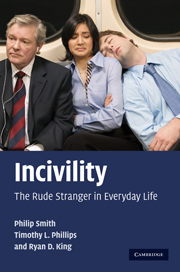Book contents
- Frontmatter
- Contents
- List of figures and tables
- Preface and acknowledgements
- 1 Redirecting incivility research
- 2 The fundamentals of the incivil encounter
- 3 Everyday incivility and the everyday round
- 4 Emotions and sequences
- 5 Gender, age and class: divergent experiences?
- 6 After the event: coping, avoiding and changing
- 7 General attitudes towards the stranger: exploring fear and trust
- 8 How to confront incivility
- 9 Twenty questions and answers
- References
- Index
6 - After the event: coping, avoiding and changing
Published online by Cambridge University Press: 05 June 2012
- Frontmatter
- Contents
- List of figures and tables
- Preface and acknowledgements
- 1 Redirecting incivility research
- 2 The fundamentals of the incivil encounter
- 3 Everyday incivility and the everyday round
- 4 Emotions and sequences
- 5 Gender, age and class: divergent experiences?
- 6 After the event: coping, avoiding and changing
- 7 General attitudes towards the stranger: exploring fear and trust
- 8 How to confront incivility
- 9 Twenty questions and answers
- References
- Index
Summary
When unexpected or bad things happen to people they try to make sense of them or to cope in various other ways with the shock of what has happened. This is particularly the case with traumatic events. Further, unusual, dangerous or serious episodes can change our mental outlook and behaviours. In this chapter we explore the implications of rude stranger encounters. We start with coping.
Coping and ontological security
Much of what we know about coping is informed by the literatures in social-psychology and criminology and concerns how people cope, and hopefully recover, from very serious events: rape; incest; predatory violent crime; domestic violence; bereavement; life threatening injury. We do not wish to claim that an encounter with a rude stranger is in the same domain as such tragic misfortunes. Most obviously intense physical or psychological harms are missing. Still, the case could be made that the encounter with the rude stranger requires some adjustments. Further, it is important that as outside observers we do not prejudge. What might seem trivial from our Olympian perspective could be deeply meaningful as a personal experience.
The argument that the rude stranger encounter well might require some coping is suggested circumstantially by findings from earlier in this book. We reported in Chapters 3, 4 and 5 that in a large number of cases people were surprised by what had happened to them. Further, many times our victims had strong initial emotional reactions, including anger, disgust and fear.
Information
- Type
- Chapter
- Information
- IncivilityThe Rude Stranger in Everyday Life, pp. 105 - 128Publisher: Cambridge University PressPrint publication year: 2010
